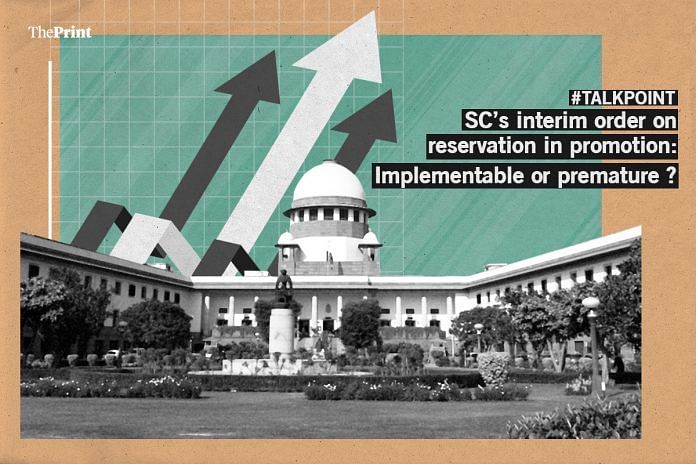The Supreme Court allowed the continuation of existing laws on SC/ST reservations in promotions in government jobs till a constitution bench rules on the same.
The long-pending and polarising issue became a flashpoint about a decade ago when Mayawati, as the chief minister of Uttar Pradesh, implemented reservations in promotion. But in April 2012, the Supreme Court upheld the Allahabad high court ruling, saying that the move was unconstitutional.
ThePrint asks- SC’s interim order on reservation in promotion: Implementable or premature?
Supreme Court interim order will allow government to fill vacancies
 P.K. Malhotra
P.K. Malhotra
Former law secretary
The vacation-judge bench of the Supreme Court has passed the interim order till the constitution bench finally rules on the issue.
The court should have clarified on what circular or rules should the government go ahead with the promotions until a final judgment is given by the Supreme Court.
The Supreme Court interim order will permit the government to fill a large number of vacancies in various departments. The circulars issued by the department of personnel and training can be followed to make promotions as per existing reservation policy.
It comes in the wake of conflicting judgments by different courts. The Supreme Court’s decision will protect the government from being in contempt. Now, the government can proceed with promotions in accordance with laws. But which are these laws? That, however, is not clear yet.
Even the Nagaraj judgment has to be revisited. With regards to the power vested with the government for reservation in promotions, there are three conditions that must be met before promotions are decided. These are backwardness, inadequate representation, and efficiency in administration.
We must remember that provisions under articles 16(4), 16 (4A) and 16 (4B) of the Constitution are only enabling provisions, and not a fundamental right. A few years ago, there was a case relating to reservation in appointment for faculty posts at the super specialty block in AIIMS. The Supreme Court ruled that no reservation in promotions would be given. All parties had protested this decision, but nothing happened after that.
Only 4 SC/ST officers held secretary rank in government in 2017
 Amar Singh
Amar Singh
IAS (Retd), and Vice President, PPCC
Sensing that the effort to block affirmative action for weaker sections is difficult in government policy, many have resorted to using the courts to slow down the implementation.
Although the recent verdict of the Supreme Court on reservation in promotions for SC/STs is being hailed as a go-ahead for the implementation of the policy, it is only a temporary relief because the Supreme Court will study validity of the law. It is more likely to create a situation where, given the prescribed conditions, things will remain in a limbo.
The makers of the Constitution used the systemic deprivation of all rights, social discrimination and violence as the basis for giving protection to the deprived sections of society.
Gaining employment and position does not ensure the end of social discrimination and, hence, should not be used as a single yardstick for calculating backwardness. Backwardness results from a complex web of social, economic and political structures built to safeguard privilege.
As far as the criteria of inadequate representation goes, one can pick up the list of senior-most officers, occupying critical posts across all services, and find the answer. There were only four SC/ST officers at the secretary rank in the government in 2017.
Overall efficiency in government is hard to quantify, and the reporting of output by officers/staff is not free from social bias. Hence, in conclusion, what’s needed is a new, comprehensive law to end the ambiguity and ensure proper representation to SC/STs in view of the unique nature of discrimination and disadvantage they face.
Vagueness in promotion process is the real problem, courts can’t fix it
 D. Shyam Babu
D. Shyam Babu
senior fellow, Centre for Policy Research
The first thing is that court cases – especially in cases like these – are very time-intensive. So many people have retired without being promoted because this case has been pending in the court. They did not get the promotions they deserved.
At the Supreme Court level, what is being debated is the principle of the issue. But the problem lies elsewhere. Promotions are not only about seniority. The annual confidential report (ACR) is the yardstick by which officers are measured. This report is penned by the supervising senior officer. He or she rates not only your performance, but also testifies to the health and fitness of the candidate.
This is where the SC/ST communities are agitating – that in this process, they are not treated fairly. It’s a simple question – do we have a rational and transparent promotion policy? Not really. Earlier, one didn’t even know how they were reviewed in the ACR. The court recently asked for such reports to be made public.
In Maharasthra, a public servant was denied promotion because his ‘character and integrity was not good’. Can anyone substantiate this? Does it mean anything? If the vagueness of the process is reduced, only then will demands for reservation-based promotions subside.
We need to address the basic problem by rehashing the process on the basis of which promotions are given. This is a policy issue, and courts should not treat it as an individual case. The time a court will take to resolve the issue only provides the government with an excuse to not promote public servants.
(The views expressed are personal.)
Without quota, representation at senior levels will be skewed in favour of upper castes
 Udit Raj
Udit Raj
BJP MP and national chairman, All India Confederation of SC/ST Organisations
This recent judgment by the Supreme Court has said one thing, which is that the Nagaraj case was decided by a larger bench of five judges, and unless a bench larger than this delivers a judgment, the ruling will hold.
It is clarificatory in nature, and not a judgment. In the Nagaraj case, there were three conditions. One, reservation in promotions shall be available if it doesn’t hamper the efficiency of administration. Second, in case of inadequate representation in the field/cadre, promotion shall be given. Third, it must check backwardness. All these three conditions have to be met to allow reservation in promotion.
There is always an inadequate representation. There are about 150 secretaries in the government of India, but few are from the SC/ST category. Talking about backwardness, when these castes are mentioned in articles 341 and 342, they are automatically backward. How can the Supreme Court counter a constitutional provision? As for efficiency, two studies have been done to check if reservation hampered efficiency. They concluded that reservation has instead enhanced efficiency.
Nitish Kumar and Ashok Gehlot satisfied the conditions and continued with reservation in promotions. Due to weak representation or a weak argument by the Mayawati government, the Allahabad HC denied reservation in promotions on 4 January 2011.
Without reservations in promotions, caste representation in senior levels would be highly skewed in favour of the upper castes. The government needs to introduce a comprehensive legislation (code) to do away with the unnecessary conditions of the Nagaraj judgment. We ask for no extra rights, only fair treatment. We want to lessen the ambiguity in implementation of reservation by removing the discrepancies caused by executive orders issued over time.
Govt needs to bring in a code to do away with unnecessary conditions of Nagaraj judgment.
Supreme Court had asked state to show compelling reasons in each case
 Aadil Singh Boparai
Aadil Singh Boparai
Advocate, Supreme Court
It is a settled position in law that the rights accruing to candidates or petitioners in terms of an interim court order are subject to the final decision in the said case.
In other words, promotions made in the interregnum or during the pendency of the petition before the Supreme Court will ultimately depend on the outcome of the final judgment of the Supreme Court.
The Supreme Court will be guided by the binding precedent in the M. Nagaraj and Others vs. Union of India and Others case, which is a constitution bench judgment of five judges. The Supreme Court in that case had held that reservation in public employment depends upon quantifiable data in each case.
The court laid down the law by categorically stating that the state concerned will have to show in each case the existence of compelling reasons, namely backwardness, inadequacy of representation and overall administrative efficiency, before making a provision.
The onus was put on the state to collect quantifiable data, showing backwardness of the class and its inadequate representation in public employment besides compliance with Article 335 of the Constitution, which allows the state to relax qualifying marks or standards of evaluation.
The Supreme Court has, time and again, held that affirmative action seeks to provide a level playing field to the oppressed classes with the overall objective to achieve equality of opportunity.
Early for SC/ST employees to rejoice, this is just an interim order
 Maneesh Chhibber
Maneesh Chhibber
Editor (Investigations & Special Projects), ThePrint
A division bench of the Supreme Court has allowed the Union of India to continue with reservation in promotions for its employees belonging to the SC/ST community “in accordance with law”.
However, before employees belonging to the SC and the ST categories start rejoicing, here’s a reality-check: the SC order is only an interim order and a lot will depend on how the constitution bench of the Supreme Court, which has to decide the sticky issue, decides on the issue.
In fact, this is not the first time the Supreme Court has said something on these lines. In its interim order in the matter – Jarnail Singh and others vs Lachhmi Narain Gupta and others – another bench of the top court on 17 May directed that “the pendency of this Special Leave Petition shall not stand in the way of the Union of India taking steps for the purpose of promotion from ‘reserved to reserved’ and ‘unreserved to unreserved’, and also in the matter of promotion on merits”.
More importantly, the bench on Tuesday, while clarifying that the Centre was not debarred “from making promotions in accordance with law”, also stressed that the promotions shall be “subject to further orders, pending further consideration of the matter”.
Simply put: this means that, if tomorrow, a larger bench, which is to deal with the matter, decides that reservations in promotions can’t be allowed unless the criteria fixed by a five-judge bench in M. Nagaraj versus Union of India is met, the promotions, if any are done as per this interim order, may be reversed.
After the setback, more political than legal, which came following the Supreme Court order in the SC/ST Atrocity Act case, Tuesday’s interim order will be flaunted as a wonderful achievement by the Centre.
But, from a purely legal point of view, the order is what it is: interim.
Compiled by Deeksha Bhardwaj, journalist at ThePrint.




adequecy of representation is to be calculated in which promotions are to be given and not in IAS and IPS officers counting.Reservations in promotions are fup to Grop B level only.Why people of half knowledge are bringing Group A services SC and ST people counting in to picture when promotions are to be given below Group A level posts.Sc/Stpeople alreday taken away 5 lakhs central government jobs of OBC ,OC and Muslim in the name of reservations in promotions.In next 15 years single job will not go to SC/ST people.Let the governmant publish white paper that how many SC/ST people are there.
I urge THEPRINT channel to talk about 117th amendment